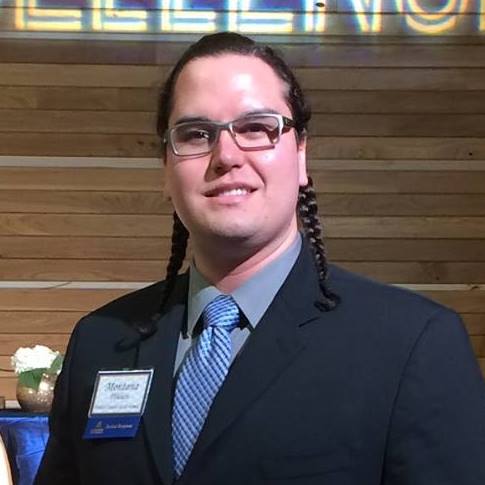
Montana Duke Wilson on his work for his tribe and how his research will aid their economic development.
Montana Duke Wilson was raised on politics. Growing up on the Fort Peck Indian Reservation, which is home to the Assiniboine and Sioux tribes, his grandfather Ray K. Eder served on the Tribal Executive Board for 24 years. He also served as both Vice Chairman and Chairman of the Fort Peck Tribes, the head of the tribal government.
Montana [2017], a Gates Cambridge Scholar-Elect, accompanied his grandfather to multiple tribal events. He recalls being around five years old when his grandfather played an important role in establishing a tribal police force and being present at the groundbreaking ceremony in the late 2000s for a water treatment plant. He also remembers witnessing his grandfather preside over the removal of a Chairman for misdemeanours against tribal policy and procedure. “My grandfather did a lot for our tribe and that had a big impact on me,” he says.
At high school in Wolf Point, Montana excelled in science and was a finalist three times in the Intel International Science and Engineering Fair. So when he enrolled at Dartmouth College as a Gates Millennium Scholar in 2009, he initially intended to study Engineering, but he changed his mind in his second year.
Suicide epidemic
Over the summer of 2010 he worked as an Assistant Secretary for the Fort Peck Tribes. One project he worked on involved tackling a suicide epidemic among young people on the reservation. Out of a population of 12,000, there were 25 suicides of young people in one month alone.
The epidemic corresponded to high general levels of suicide among Native American populations. US government figures show Native American teenagers and young adults commit suicide at triple the rate of their peers with suicide being linked to social issues such as substance abuse, isolation, joblessness and incarceration which disproportionately affect Native Americans.
Montana says the situation on his reservation in the summer of 2010 demanded drastic action. “We declared a state of emergency. The US government sent in a public health response team. We criminalised suicide. That meant anyone talking about committing suicide could be arrested and transferred to a mental health programme. We also had to limit traditional tributes paid to people who had died because it encouraged young people to commit suicide,” he says.
Traditionally the deaths of young people are honoured with a huge family funeral and tributes. “We were concerned young people were using suicide to get attention from their parents,” says Montana. The measures were effective. The number of suicides dropped to 10 a month by the following month and a couple of months later when Montana left to return to college there had been no suicides in the preceding month. The experience brought home to Montana what an impact he could have in the policy area.
He switched his degree to Government and entered the Central Intelligence Agency’s Pathways programme, a government programme established to give students an opportunity to explore federal careers.
During his time at Dartmouth, Montana also took part in the global study abroad programme Semester at Sea through the University of Virginia. The course is a multi-country study abroad programme on a ship which lays a big emphasis on global comparative study.
At one point in his travels, Montana witnessed a Tibetan monk and nun set fire to themselves in a town square in Tibet to protest Chinese occupation. That experience too made a lasting impression on him, given the history of Native Americans.
Public defender
Before completing his degree, however, Montana had to take leave from the College for personal reasons. While he was on leave, he was exposed to another aspect of community life which was to have a big influence on his career trajectory.
Montana became more active in his tribe and was offered a job as an intern at the public defender’s office. He had taken some law classes at Dartmouth so was able to write briefs. He took his tribal bar exam and was admitted as a full member of the tribal bar which meant he could practice on his own. Eventually, he was contacted by the Chairman of the Fort Peck tribes and was offered the post of supervising prosecutor, overseeing criminal prosecutions and juvenile cases. The cases he handled covered everything from traffic violations to murder.
His caseload was immense, involving dealing with 16 bench trials and two jury trials a week. The prosecution team was severely understaffed with just four prosecutors handling around 6,000 cases a year. Montana worked with the FBI and state law enforcement on a multi-disciplinary team to get crime levels down and succeeded in reducing the annual caseload by about 2,000. During his time as a prosecutor, Montana realised he did not want to return to Dartmouth College and instead transferred his credits to Montana State University.
There Montana found that he needed to take an Economics class to qualify for his degree in Political Science. He discovered he enjoyed Economics so he decided to pursue a second degree that runs alongside his degree in Political Science and minor in Native American Studies. This has meant that he can apply what he learns about indigenous methods and understanding to his other studies.
At MSU he has also been a peer instructor on three courses for Study in Federal Indian Law & Policy, which covered issues such as water rights and natural resource development, The Study in the Economic Way of Thinking and The Study in the Principles of Macroeconomics.
Economic development
For his final year – 2016/17 – Montana won the Udall Scholarship in the field of tribal public policy based on his work in tribal economic development. Montana is now working on a cost benefits analysis of treatment courts for drug offenders, relative to incarcerating these offenders.
He decided to apply to the University of Cambridge as he had missed out on study abroad at university and he became enthusiastic about the Development Studies MPhil course taught at the University and how he could use that to evaluate tribal policies. He is the first Native American Gates Cambridge Scholar.
After his masters course, Montana intends to return to his tribe to work on economic development issues. Of the Gates Cambridge Scholarship, he says: “I really respect the Gates Foundation’s values and I wanted to be associated with someone who is doing something good in the world.”

Montana Wilson
- Alumni
- United States
- 2017 MPhil Development Studies
- Queens' College
Montana Duke Wilson is an enrolled member of the Gros Ventre tribe of the Fort Belknap Indian Reservation and is descendent of the Assiniboine and Sioux tribes of the Fort Peck Indian Reservation. Prior to receiving his bachelor degrees, Wilson held commissions as the Deputy Chief Prosecutor, Assistant Public Defender, and Associate Public Defender for the Fort Peck Tribes. Currently, Wilson serves as a Magistrate in the Fort Peck Tribal Court, under the supervision of the Chief Judge. Wilson’s undergraduate education is a BA in Political Science, a BS in Economics, and a minor in Native American Studies from Montana State University Bozeman. Wilson’s education focuses on governing institutions, most notably tribal governments, and how an individual’s decision affects economic development policies. During his undergraduate career, Wilson served as a peer instructor for NASX 497: Study in Federal Indian Law & Policy for the MSU Department of Native American Studies. Furthermore, Wilson served as a research assistant and peer instructor for ECNS 105: The Study in the Economic Way of Thinking and ECNS 206: The Study in the Principles of Macroeconomics for the MSU Department of Agricultural Economics & Economics. In 2016, Wilson was awarded the national Udall Scholarship in the field of tribal public policy for his work on tribal economic development. While at the University of Cambridge, Wilson will pursue an MPhil in Development Studies. Upon the successful completion of his MPhil, Wilson plans to return to his reservation to pursue a career in economic development for his tribes.
Previous Education
Montana State University












